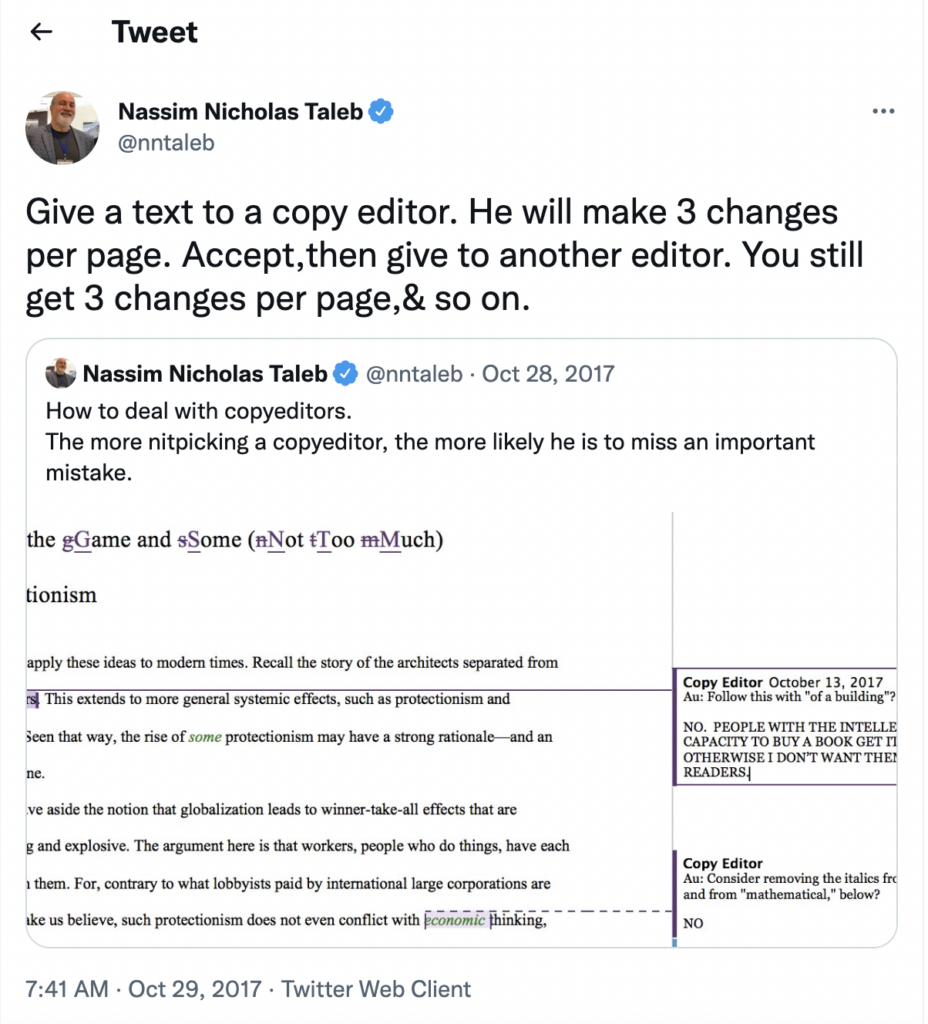
It’s easy to rattle off a long list of desired traits of content marketers.
Things like integrity, intelligence, curiosity, expertise, focus, attention to detail, etc.
But the more traits you include in your criteria, the harder it will be to index on any one of them.
And if you want someone with all those traits? Be sure you’re ready to shell out a ton of money on talent that has already proven themselves.
If you’re not Google, HubSpot, or some other juggernaut that can readily attract and pay top talent, you need to find underdeveloped talent that hasn’t been spotted or priced in just yet.
So instead of indexing on proven experience (the easiest way to gauge talent), how can you find, attract, manage, and develop unproven talent?
I’ll make the case you should only index on 3 key traits:
- Curiosity
- Courage
- Gives a shit
The rest can be trained, augmented, or forgotten.
There are caveats to this depending on your needs and industry, but I’ll cover them in a small section at the end of the piece.
1. Curiosity is the defining trait of a content marketer
I have homework for you.
Watch Malcolm Gladwell’s MasterClass.
Don’t even listen to his actual writing tips. Listen to the passion in his voice when he talks about researching his piece on why mustard has many varieties but ketchup doesn’t.
Normal people don’t care about this stuff. Journalists and content marketers do. Writers do.
The most effective content marketers will have a scattershot curiosity, more like a shotgun than a sniper. They take a leisurely walk and end up wondering about how and why lawns are aerated, the postprandial glucose effects of a walk, vitamin D absorption rates at different times of the day, and how public land use is managed and planned.
If you can find a content marketer narrowly focused on your industry, this can still work. But I’ve found that the most interesting content comes from people who read deeply and widely and have an insatiable appetite for answering complex questions.
When I wrote at CXL, I would often ask the following questions when researching a piece of content:
- Is this actually true (“you should only A/B test one element at a time”)
- Does this actually matter? Why? (“frequentist vs bayesian A/B testing”)
- Is there anything wrong about commonly accepted wisdom? Are there exceptions? (“only run one A/B test at a time”)
- What are people missing or misunderstanding about a topic they think they know about? (“social proof on landing pages”)
I’d find myself scouring obscure studies on Google Scholar, old books no one else was reading, forums and communities, and interviewing practitioners who weren’t famous or giving INBOUND talks.
I did this because I cared about creating great content, but more so, because I personally wanted the answers to these questions.
With enough practice, you can learn to decipher someone’s natural level of curiosity about a subject by reading their content. There’s a certain je nais se quois that comes across.
For example, Derek Thompson is one of my favorite writers at the Atlantic. Look at his author page. He has topics ranging from American healthcare to education to career and productivity advice.
Click into any individual article, and his content just reads as somehow deeper and different than others who write on those topics.
It’s like he personally can’t rest until he gets to a true answer, not just the commonly accepted answer.
The shadow side to curiosity is an insatiable desire for perfection, which can result in a slow production cadence.
This is balanced out with ambition and courage, which I’ll cover next.
How to Test for Curiosity
The easiest way to identify all of these traits is through a project – basically, a test article. We do test projects for all writers and marketers, whether they’re in-house or contract.
To test for curiosity, assign a topic slightly outside the writer’s usual subject area. Better yet, have them pitch a few topics, and then slightly alter your favorite one to push them outside their comfort zone.
When reviewing the draft, the trait curiosity best shows up as the writer using unusual sources. If the draft feels like it’s a slightly rehashed piece only using Google search as research, that’s not a good sign. If they scoured forums and Slack groups and watched documentaries to get to unique insights, that’s a great sign.
Interview questions to test for curiosity:
- What are the tabs open on your browser right now?
- How do you research a topic you know nothing about?
- Teach me about something.
What you want to hear is passion and attention to details in their answers.
2. Courage is what makes a good content marketer great
What is courage? The ability to do something that frightens you.
It’s not the absence of fear, but the ability to move through it anyway.
This is important for content marketers because:
- Good content often has a point of view that may not be “safe.”
- You’ll have to release “imperfect” work into the wild.
- It generally takes courage to create and share something with people who may critique you.
Courage can be fostered, but it will be uncomfortable. A great mentor who holds their mentee to high standards as well as supports them can help this process.
Two stories from my time at CXL (where I think I developed courage).
First, I had been blogging for a long time before I joined CXL. But it was mostly for myself on my personal website, and I didn’t promote it to anyone.
At CXL, they already had an audience of 100k monthly blog readers and 50k email subscribers. Everything I published would be received by an already massive audience.
In addition to that, most of my job wasn’t actually the content production, but the content marketing. Meaning I not only had to write content that was technical and demanding, but I had to self-promote it through social, search, email etc.
Luckily, my boss Peep wouldn’t let anyone get away with anything less than his standards for quality, production cadence, and results. Slowly, over time, that queasy feeling in my stomach I got before hitting “publish” or “share” faded to a whimper.
Second story: in the first month or two working at CXL, I published a piece that had inadvertently pissed off a few O.G. conversion optimization influencers, who then blasted me on Twitter.
I was mortified.
Peep, to his credit, supported me. He talked to the CRO influencers as well as reassuring me that I hadn’t done anything wrong.
Now, I still get a little nervous before publishing something contrarian.
But I always press “publish.”
How to Test for Courage
Courage is most easily tested in the interview, though not always (some people are naturally “disagreeable,” which doesn’t necessarily equate to courage). In the context of content marketing, I’m looking for courage embodied by someone’s ability to:
- Take an unpopular stance and defend it
- Reach out to important people and ask them for something (a quote, social share, etc.)
- Deal with feedback rationally (take it in stride, but not passively)
- Press publish even if the work is imperfect
- Operate confidently under uncertain instructions and ask questions that seem “silly”
Almost all of this can be assessed using your test project. In your test assignment, give instructions to take a position and defend it, reach out to experts for quotes, and potentially, don’t give *all* the instructions in a detailed fashion (note that questions are totally fine).
Good signs:
- They take a truly interesting stance in the piece and defend it well.
- They ask for clarifying answers of the instructions.
- They don’t balk at reaching out to experts.
Note: pay for the test assignment. It’s an expensive use of someone’s time, and you shouldn’t expect them to do this for free. Oddly enough, HubSpot had me do free work when I interviewed there, which I still sort of resent given their size and stature.
Then, give them critical feedback and see how they take it. Perhaps even give a piece of feedback that is questionable or wrong.
See if they pushback against it. A strong writer doesn’t let a bad editor ruin their piece (though note: you can train this confidence. Not everyone will feel comfortable pushing back against their hiring manager right away).

Courage, to me, also means that someone is unafraid to express their own goals and ambitions. You want an ambitious person who will eventually outgrow you (if not, check your own ego).
To test for courage (and ambition), these questions are solid:
- How ambitious are you?
- What’s the most courageous thing you’ve done?
- What views do you hold religiously, almost irrationally?
- What’s something you believe about content marketing that most people would disagree with you about?
3. Giving a shit can’t be trained
The most important trait of hidden content marketing talent is simply giving a shit.
I know tons of “priced in” content marketers who have big followings and powerful personal brands. Lots of them don’t give a shit. They phone it in.
This sucks. You pay a lot of money and get something an AI writing tool could produce.
I’ll gladly take someone with less “storytelling” capability (“storytelling — the great ‘suitcase word’ no one ever seems to define) who cares more any day of the week. I can hire an editor to add in some oxford commas (or not – few people care about this outside of writers, which is probably not your audience).
Giving a shit is hard to quantify. It’s certainly correlated with ambition. But you need to add proactivity and effort into the mix. You can be ambitious and day dream and complain all day. Giving a shit means you do something about it.
People who give a shit take courses, start websites, build side projects, create their own images and graphics, reach out to experts for quotes, read research papers on the topic, and generally go beyond the first page of Google search results and a Frase outline in their content research.
If you’re new to hiring it’s very difficult to identify this. If you’ve been hiring for a while, it’s almost impossible to miss.
How to Test for Giving a Shit
Curiosity and giving a shit are related, of course.
But you can see when someone gives a shit by the level of granular detail they put into the draft. No one who gives a shit brushes over a grand proclamation. They’re not hand wavy. They flesh it out entirely so the audience understands.
Giving a shit comes out in two other distinct ways as well: they reach out to experts for interviews, and they take feedback well. Someone who takes feedback well cares about the work, not their ego. They care about the truth, not being right. This is a great sign.
To test for giving a shit, you want to hear passionate responses:
- How successful do you want to be?
- What’s your driving force? What’s your long game?
- Who are our competitors?
- How did you prepare for this interview?
- Why do you want to work here?
Other content marketer traits that may matter (depending on your industry)
Look, in planning this piece, I read a bunch of other articles on “traits of successful content marketers.” Most of them are bullshit lists of vague traits like “focused,” “motivated,” “analytical,” etc.
Be honest with yourself. How much do you care that your content marketer is analytical? Or highly organized? Does it even matter if they produce great work?
In trying to optimize for all metrics, you really optimize for none of them and you get a middle of the road person who checks all the boxes but excels in none of them. We’re looking for future outliers here.
However, there are a few caveats depending on your specific purposes.
Subject matter expertise
While I’d argue that most content marketers can become subject matter experts in less time than you’d think, this can be important for some spaces. In my opinion, 3-6 months of dedicated study plus hands-on experience can do wonders, unless you’re writing about AI or something.
Ask yourself: are you writing for an incredibly skeptical and technical audience? In this case, you may need a subject matter expert.
Note: subject matter experts who can also write are rare, and therefore expensive. This is a hard path to go down (though because it’s hard, it can be extra rewarding if you pull it off).
My recommendation would be this: try to find a hungry and curious content marketer who can work with subject matter experts like a journalist. Then you can save your developers’ time for coding and shit, not writing about it.
Or, hire draft.dev.
Detail orientation
Detail orientation probably doesn’t matter as much as you think it does.
I, for example, am not detail oriented at all. But I’ve driven millions of pageviews and millions of dollars with my content.
How? I use checklists and editors.
Again, there are caveats – you need a detail-oriented and conscientious person if you’re writing in a highly regulated space like finance or healthcare.
But most often, detail orientation (beyond a base level) is an overrated trait to index on. And it’s often inversely correlated with creativity, so pick your desired trait.
Also, you can easily filter out people who completely lack detail orientation (as well as those who don’t give a shit) by adding a “brown M&Ms” clause into your application. Ask for something wonky and specific, like using a specific subject line in their email or listing their 5 favorite movies. If they skip this, ignore the application.
Finally, if their draft is riddled with typos, you obviously know not to hire them.
Channel Expertise
Channel expertise is mostly overrated, except when it’s not.
If you have strong conviction that your brand will play best in, say, YouTube, it obviously helps to hire someone who understands the platform. But I’d still argue that someone sufficiently curious and courage can and will be able to figure out the platform.
Channel expertise becomes much more important as you scale. At the startup and scale up stage, what you want is someone creative and intellectually honest, someone who can pivot and test quickly.
This changes as you become more averse to risky bets. But if you’re at this scale, you probably don’t need to read an article on finding underdeveloped talent. You can pull people over with the allure of your brand, comp packages, and the opportunity to work on something already established with tons of volume.
Still, there are obvious deal breakers. If you need to write long form content, and a candidate can’t or won’t write, they’re not a good fit. If you know video matters, but a candidate won’t get on camera or learn the ins and outs of video (instead preferring to spend time in Google Docs), this is a deal breaker.
Learning to identify diamonds in the rough
This is an article about how to identify talent that doesn’t have an insanely impressive track record. If someone is obviously talented, you’ll end up competing with Google, HubSpot, etc. Most of us aren’t in that position, so if you’re a manager or leader, it’s imperative to learn how to identify and attract up and coming talent.
This is also an article about tradeoffs and omissions. Most hiring managers expect to hire a unicorn. My argument is you should consider which traits you can forget about or ignore to give you space to focus on the traits that actually matter. And in my opinion, for content marketers those traits are:
- Curiosity
- Courage
- Giving a shit.
Disagree? Tweet me


